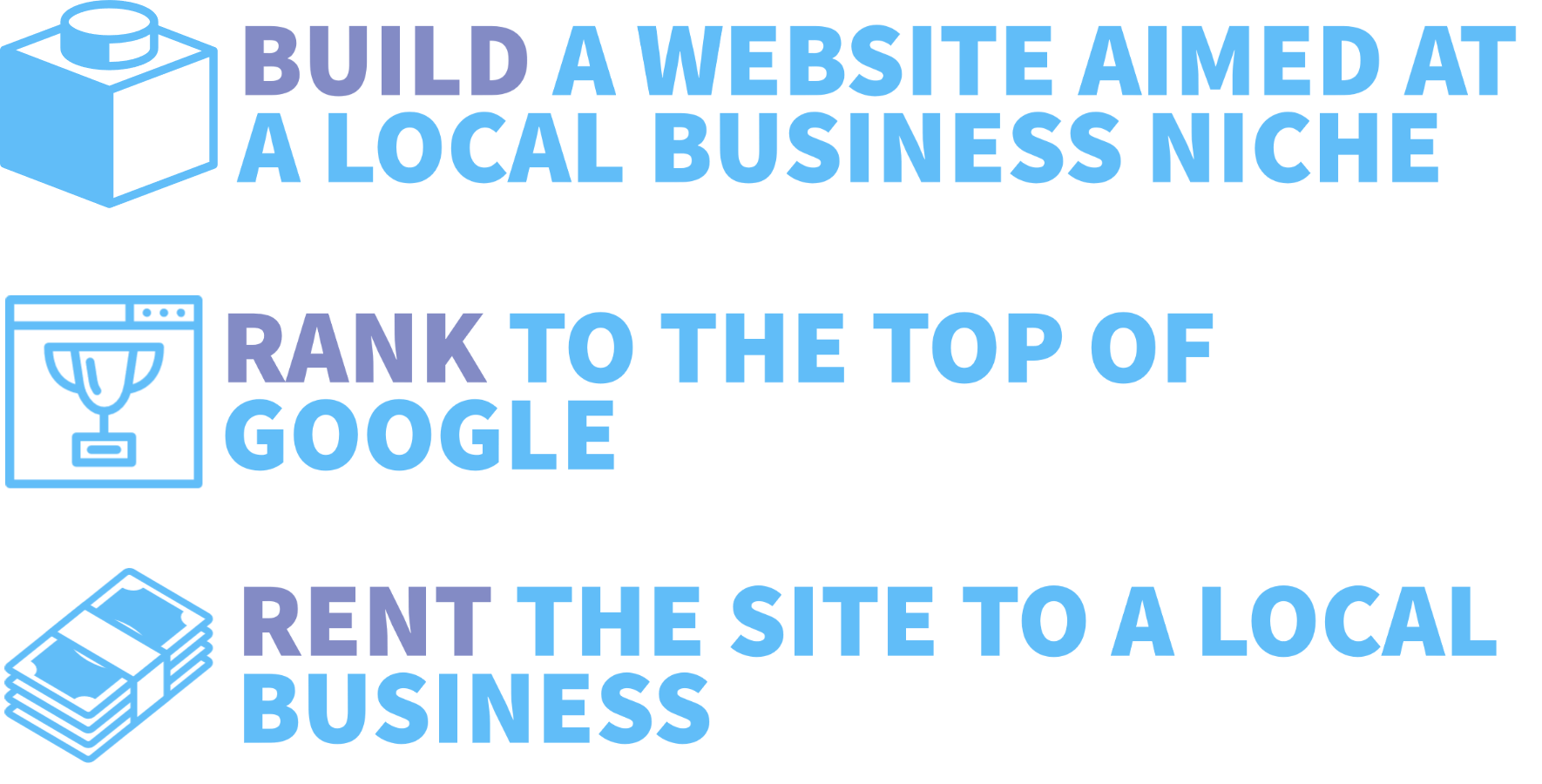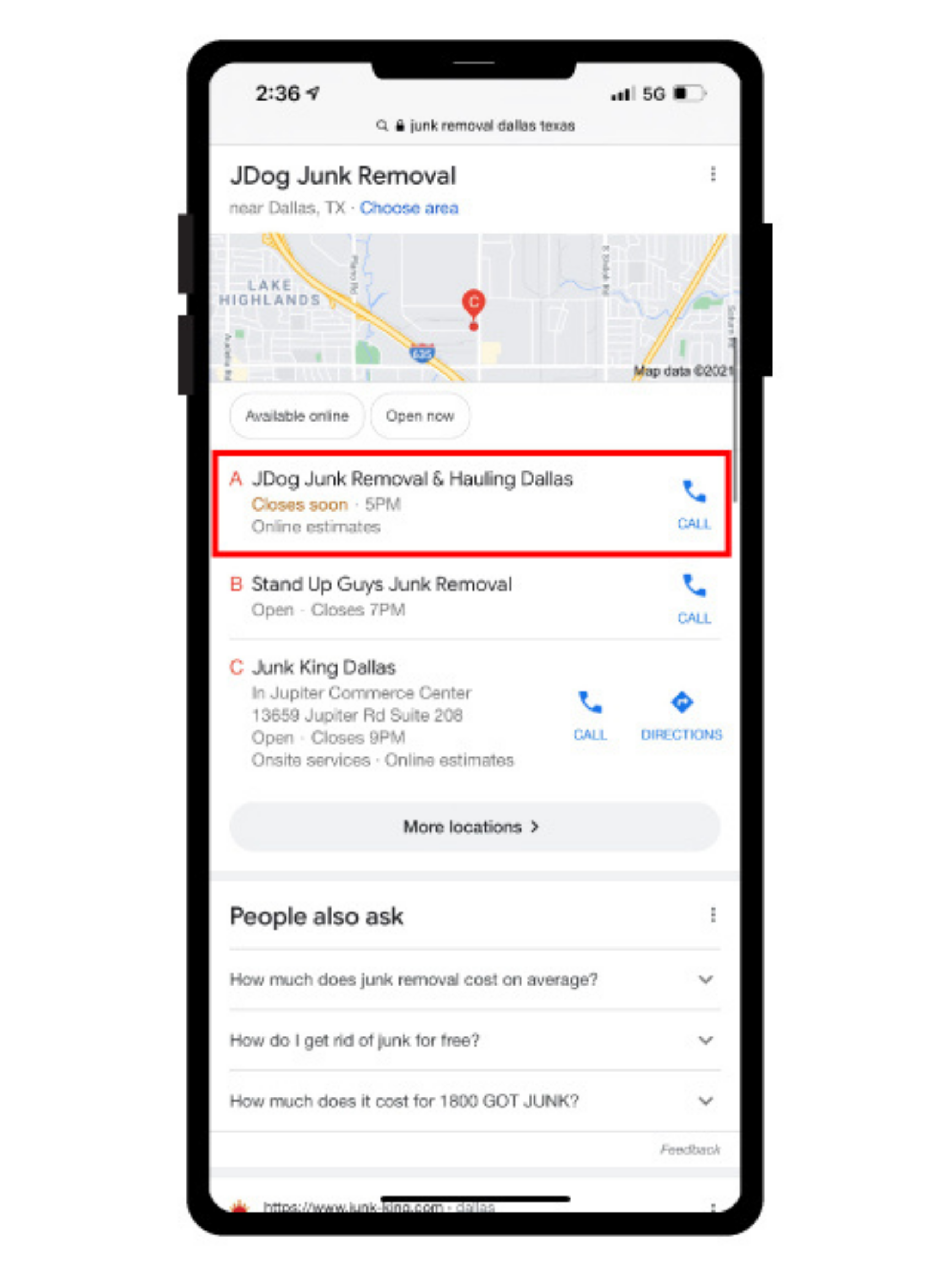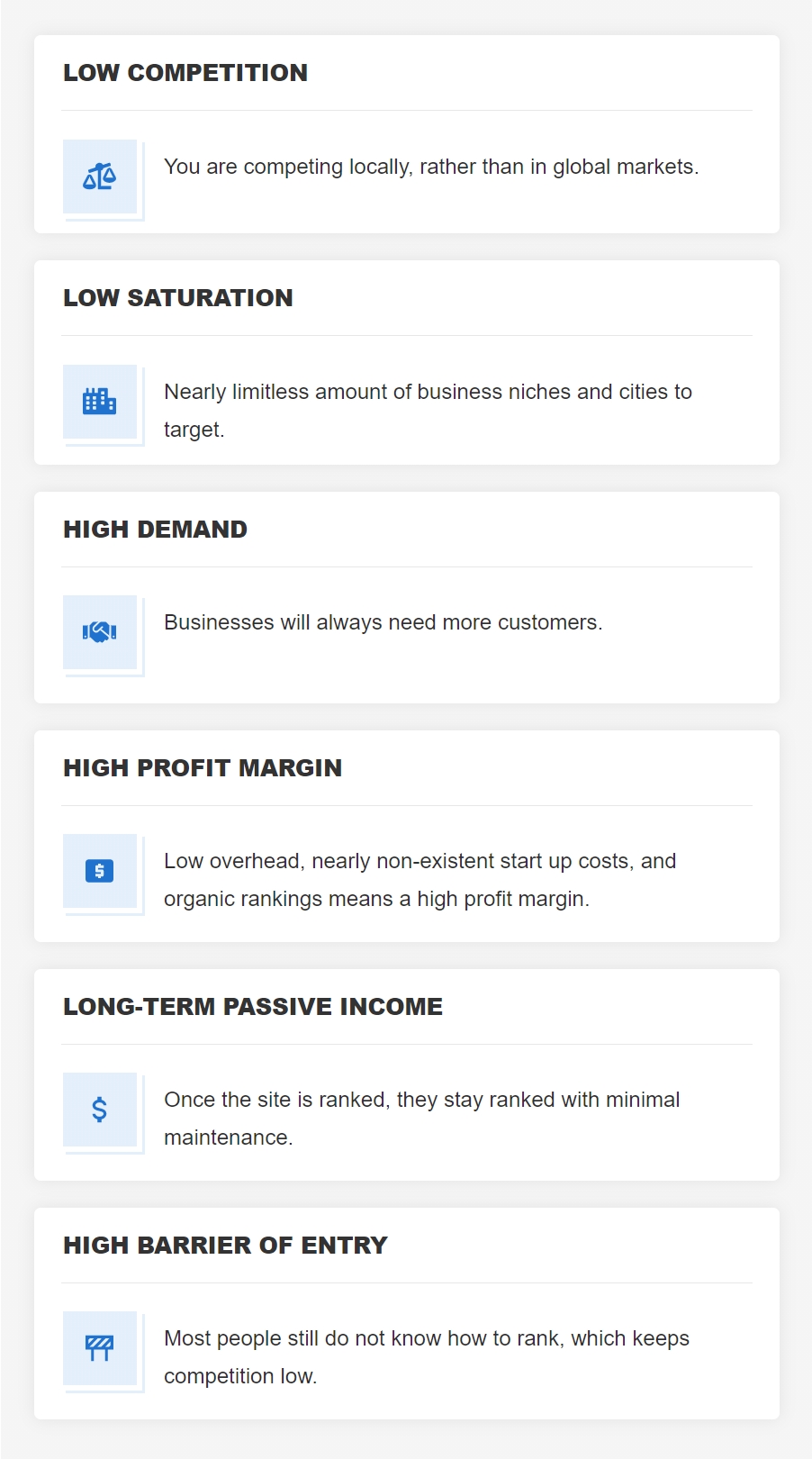

In 2021, Lead Generation may be the only form of digital marketing that offers unlimited scalability and true, passive income. This accessible, untapped business model utilizes basic web design and search engine optimization to provide you with valuable and license-able assets (websites) that generate leads to local businesses and essential services.


Do you want to escape the 9-5 office grind? Do you want be your own boss and stop selling your time for money?
Lead Generation may very well be the answer to your questions.
Through building, ranking, and then leasing websites to local businesses, Lead Generation offers an innovative, passive-income based business model that stands out from the already over-saturated landscape of digital marketing.
In this article, we will learn how to:
1. The Lead Gen Business Model
To show you how the business model works, in 2016 I built and ranked the following site (lansinglimoservices.com).


Once the site was ranked and bringing in customers, I started researching the limo market to find a company willing and capable of taking on more business. It was an easy sell, to say the least.


My limo client pays me $1,000 a month. We've had a happy and healthy relationship for nearly 5 years now.
I've repeated this process over 80 times now, with clients paying anywhere from $500 to $2,500 a month.
The best part? Site maintenance is extremely low, so once you have the ranking and a suitable client, all you have to do is sit back and enjoy the passive income.
In most business models, more clients equate to more work.
However, with Lead Gen, 99% of the work is up front. Once you've landed one client, you start working on the next. 10 clients could easily net you $5,000-$15,000 a month, but your work load never increases.
One of my partners decided to stop scaling once she hit $100,000 a year. All of that income is passive, so she spends her days traveling North America in a decked out Mercedes Sprinter Van.
She spends about 5-10 hours a week doing basic site maintenance for her 25+ clients, which she amassed in the short span of three years after taking this local lead generation course.


The Golden Handshake
Unlike contract-based SEO, where employers will quickly dispatch you once you've ranked their sites, Lead Gen fosters a "golden handshake."
My clients have no reason to leave our business relationship. We make money for each other; symbiosis at its finest.
Even if they were to break off, I have a ranked and established website (that I have owned from day one) and will simply direct my leads elsewhere.


The key to Lead Gen is local, as local businesses are infinitely easier to rank than national businesses. Major companies spend millions every year ranking their sites.
Localized sites, however, can be ranked by you, in your living room, on your Macbook.


Over the last decade as a digital marketer, I've had ample experience in:
- Dropshipping
- Social Media Marketing
- Affiliate Programs
- YouTube and Google Advertising
- eCommerce
- Amazon FBA
While many of these business models offer great opportunities for careers, none compare to the scalability and passive income potential of Lead Generation.
For the rest of this article, we'll disclose valuable, insider information that will set you on a path to financial freedom through Lead Generation.
There is a lot to learn, so stick with me. And hey, do yourself a favor...
Don't sell yourself short and skim through this article. You owe it to yourself to absorb the following information in full.
Let's get started!
2. Do Your Market Research


Choosing Your Niche
There are hundreds of niches and thousands of cities. Some are better than others - and it's not difficult to to identify which one's will make you the most money.
You'll want to find niches that are:
- In demand and have a high search volume
- Have weak competition
The niches I have found to be the most workable and most profitable are as follows:
- Cement and asphalt
- Heating, Ventilation, and Cooling
- Window Installation
- Tree Removal
- House Painting
- Roofing
- Bathroom and Kitchen Remodeling
- Limo Rental
The list can go on and on. Remember, you want businesses that are local, essential (meaning they're recession proof), and dependent on skilled labor. The stuff that never goes out of style.
You'll also want to make sure you choose businesses that make moderate to high income per gig.
For instance, house painting jobs can costs thousands of dollars and are easy to track on your end, whereas massage therapists might only make $50-$100 per gig. The profit ceiling is much higher for high paying contract work; although the competition may be greater.
If you need more ideas, check out Thumbtack.com


Choosing Your City
The ideal population range for your target cities should be between 75k and 250k.
Ranking a site aimed at a city with a higher population becomes exponentially more difficult. Remember, you need to crack into Google's top 3 spots.
If a city is too small, then it is likely there won't be enough leads to justify your service in the first place.
A balanced market will still provide ample leads and will be relatively easy to rank.


Sizing Up Competition
A big part of launching a successful SEO business is picking niches in cities with less competition - and that includes ranking competition, too.
Think about it. Do you really want to waste time and resources trying to go head to head with businesses who are ranking their own sites?
When doing market research, you'll want to consider the following things:
- Overall site quality and optimization
- Keyword choice
- Homeadvisor review (to determine the lead revenue potential)
- Amount of backlinks pointing to their site
- Citation
It's fortunately pretty darn simple to find out whether it's going to be easy or difficult to rank a site into Google's top 3.
There are dozens of ways to effectively find that "low hanging fruit", but for now I'll outline two of my favorite methods.
The first is to simply google a city and niche. Let's try "Lansing HVAC."


You'll notice there are hundreds of reviews for each site. This is an example of a niche that is going to be extremely difficult, despite existing in a city with an ideal population.


An ideal niche would have three listings with 15 or fewer reviews each. If a listing doesn't have any reviews what-so-ever, then you may have found yourself your own little gold mine.
Now, you'll notice that "Aaron's Plumbing" is pretty dominant in the listing; 203 reviews and a 4.7 rating. If you wanted to outrank that listing, you're gonna have to put in a lot of work
But remember, the primary goal is to break into the top three. Overall, it would be fairly easy to rank a plumbing website in the Lansing area.
Checking Backlinks
One of the most effective ways to gauge the power of your competition is to check their site's backlinks.
A backlink is essentially a link from one site pointing to another.
If example.com has, say, 25 backlinks, that means there are 25 other websites referring to example.com with link. Google then uses this data to index and rank search results. The more backlinks a site has, the higher they will generally rank in Google.


However, not all backlinks are equal in their value. A link from some crusty blog with 4 views per month is not going to generate the same ranking power as a reputable website, like WSJ.com or Wikipedia.com.
We at Moneyking highly recommend using the webapp Ahrefs, which is the standard analytics tool most commonly used by anyone involved in SEO. It is a bit pricey, but extremely valuable.
If using ahrefs, you'll want to check the "referring domains" (or RD) for your competing sites. Anything under 50 referring domains is generally fairly easy to rank against.
While 50 referring domains might seem like a lot, it is more than likely that many of these backlinks are from low quality sites. Remember, it's all about quality over quantity.


This means you can outrank out a site with 50 RDs with 15 high quality RDs.
A major part of what you will ensure your success is creating high quality sites and also partnering with other high quality sites.
But more on that later... Up next we learn what goes into building a great website.
3. Build Quality Websites
For many, website building can be an intimidating process, but gone are the days to needing to understand HTML to build a high quality site.
Wix, Weebly, and WordPress all offer easy to use templates and drag and drop functionality. They all have free versions that still offer a totally usable feature-set, too.


Choosing Your Domain
But first, you'll want to pick your domain. I'd recommend using a city + service format. For instance:
- lansingroofingpros.com
- albionhvacexperts.com
- traversecityseawall.com
The goal is for Google (and also prospective customers) to think your site is the home of the recommended local business for the area - and a simple city + service domain will help ensure that.
However, you don't have to use this method, especially if you're trying to target a larger area or multiple cities. In that case, you might want to try something to the effect of:
- quadcitiescement.com
- westmichiganelectrical.com
Once the site is built, make sure to put a big phone number, and other important information, in the top left corner. We read from left to right, top to bottom, so use this knowledge when building your site.
The goal is to put the most important information in places where the human eye naturally scans.
Notice below how the most important information is in the top-left corner.


Tracking Number and Voicemail
Once the calls start coming in, you'll want your clients to know which leads came from your sites.
Do do this, attach a Google Voice tracking phone number, one that ideally records calls and provides a "whisper feature." This will allow you to record a quick voice message that plays out before every voicemail.
"This client was sent to you by DaveLeads."
Your clients will be impressed. Trust me.
Site Design and Directories
Fill the rest of the page up with useful information and a quote form. If you can keep things simple, usable, and informative, you'll find yourself with a quality website.
In addition, you'll want to register your website as a Google business, which will also put you on Google maps.
And lastly, make sure to spend some time on the many citations and directories that exist.
These are essentially active databases that customers can access to find businesses. They'll list your name, contact info, address, reviews, ect and are really important for achieving an accurate listing.
They range from the big players, like Facebook, Instagram, and Angie's List, to smaller, more localized directories. There could be hundreds of different citation websites, but being listed in a few of both major and minor directories can go a long way.


Up next, we'll learn how to optimize your site, both inside and out, so that it floats all the way to the top of Google!
4. Rank Your Sites on Google
On-Site Optimization
When you create a website, it starts off deep in the abyss of Google's index. It takes time and effort to establish enough credibility to float to the top.
This process of ranking a site is called search engine optimization, or SEO.
The primary processes for SEO involve on-page and off-page optimization.
On-page refers to all of the measures you can take within the confines of your website in order to boost its Google ranking.
These include:
- Technical optimization
- Server speed
- Source codes
- IP addresses
- Server speed
- Content
- Text and keyword density
- Text structure and formatting
- Graphic and video content
- Meta-tags
- Text and keyword density
- Internal links and structure
- Content focus
- Internal links
- Site logic structure and menu systems
- Content focus
- Design
- File sizes
- Mobile optimization
- Call-to-action items
- File sizes


Google is really good at identifying quality websites. Fortunately for us, the site building webapps listed earlier provide an excellent framework for you to build something of high quality.
At the end of the day, though, it comes down to the content you produce, the framework in which you organize that content, and making sure it is all hosted reliably.
Quick Tips for an Internally Well-Optimized Website
If you cut through all the Jargon, basically what we are saying is that you should create websites that look more like this:


...and less like this:


Now, it is likely your sites wont look like Apple's - and that's okay. But creating a decent website is a very attainable thing, even for a beginner.
Off site optimization, though, is where the real skill comes in. This is the stage where without training and mentorship, most will fail.
Off-Site Optimization
To explain Off-Site optimization, you need to view Google's indexing system as a popularity contest.
Imagine that you just created a band.
In the beginning, you can't get gigs because no one knows who your band is. You practice, you write music, you build your social presence.
You slowly start building credibility.
Now, imagine some high level music industry professional stumbles across your music online and takes a real liking to it.
He starts vouching for you, sending your tunes to agents, managers, and his label. Using his platform and credibility, he is able to boost your band from unknown to legitimate and popular.
This is an example of Off-Site optimization, or more specifically, high quality backlinks. The record label exec is a reputable and popular website that gives a shoutout to your blog.
On the converse, imagine if instead of a record exec, it was some chumpy college student posing as an agent that took a liking to your music.
He starts obnoxiously parading your band around campus, emailing local venues, and spamming socials, but he doesn't know how to do it gracefully or professionally.
He makes your band seem amateur, illegitimate, and unprofessional.
This is an example of a low quality backlink.
The single most effective way to outrank your competition is to supply your site with legitimate and high quality backlinks. You need a network of popular sites to essentially vouch for you, which tells Google that your site is worthy of being ranked.
So, how do we do this?
The most effective way is getting into a blog network.


Say you're trying to rank a roofing site. What you'd want to do is link up with a few other SEOs trying to rank roofing sites in different areas and give each other backlinks.
It's akin to cross posting in social media marketing. Like when Instagram influencers promote the content of other influencers (in exchange for the promotion of their own accounts).
Think of it as one big massage train with up to dozens of sites all collectively linking to eachother's content.
This allows the network's overall ranking power to grow exponentially as each individual site becomes more and more legitimate.


When you combine blog networking, guest posting and inclusion into public directories, it becomes really easy too outrank your competition.
Common Pitfalls (What to Avoid)
Google has a number of preventative measures to bust people trying to game the system.
And believe me, there are a lot of people out there selling shortcuts and cheats, but these methods will assuredly get you shadowbanned on Google, which is essentially a death sentence for your site.
Do not buy cheap backlinks, especially from overseas marketers. Many provide irrelevant links and there is no way to monitor the quality.
The trick is to work with other professionals with the same goals, who are all striving to produce the best content they possibly can.
Google genuinely wants to float quality content to the top of their search engine - and they're extremely effective at doing so. Once you understand specifically what they are looking for, then it becomes much easier to rank.
Remember, this is not about gaming Google's system. It is about providing a valuable service to trusted businesses using high quality assets.
5. Find Clients and Make The Sale
Give Before You Receive
One of my first rankings was a seasonal Christmas light installation site.
There was little to no competition in the area - and once November hit, I was getting dozens of calls a day.


Instead of immediately making sales calls, I simply started forwarding the calls to a local professional of my choosing.
Every time the business received a call, they were met with an intro message...
"This lead was sent by DaveLeads."
A week later I followed up - and since I had already landed them a half dozen clients, the owner was nothing short of enthusiastic to hear what I had to stay.
Structuring Your Deal


There are many different ways to structure your deals.
For this particular client, since it was seasonal, I asked for 10% of their closed deals.
I prefer, however, for pretty much all other clients, to settle on a flat monthly licensing fee.
Depending on the revenue you are bringing them, this could range between $500 and $2500 a month.
The primary reason I prefer this model is because you have to rely on the good faith of your clients if you are charging a percentage of closed deals (or if you charge per lead).
95% of my clients operate in good faith, but of course you'll have the occasional instance of an owner trying to smudge their numbers to save money.
You don't have to worry about this with a flat monthly fee, though, which makes things considerably easier.
You don't have to be the prototypical sales virtuoso to be successful in Lead Gen. The key here is giving results ahead of time.
Far too often I see fresh SEOs, hungry for quick cash, throw away a potential client by pushing the sale before it's been primed.
Give clients a reason to desire your service. It is so much easier to make those first sales once you have established rapport...
And you do this, as we have previously discussed, by sending them leads ahead of time.
6. Rinse, Repeat, and Scale
I originally got into digital marketing through Amazon FBA and Facebook advertising.
But one of the reasons I changed my focus to Lead Gen was because, due to passive income, it is infinitely scalable.
Let's say for your first site, you build and rank it with no outside help. Once you start generating leads and find a client, there is very little maintenance work. Just sit back, maintain the relationships with your client base, and collect your money.


You can, if you want, just rinse and repeat this process on your own until you've reached your desired income level.
The Trick To Effective Scaling
The real big brain move, however, is to eventually hire outside help.
The trick to scaling is outsourcing simple, repetitive, and ultimately time-consuming tasks to virtual assistants.
You can hire writers from Upwork or Fiverr. For VA's, I personally like Freeeup and Freelancer.
I've known SEOs who do most of the work themselves - and others who outsource nearly every aspect of their business.
In my own operation, I have over 30 writers responsible for researching and writing blog content and a small staff of web developers and graphic designers to make my sites look sharp.
My VA's, which I pay anywhere from $5 - $10 an hour, will handle site optimization, like building high quality backlinks, site updates, and managing citations and databases.
I personally use TimeDoctor to manage employee working hours. It sends screenshots every few seconds and tracks everything from keystrokes, to mouse movements, to idle time.
If someone is not using their time effectively, I am quickly notified. I've actually had employees tell me that they appreciate using it, because it keeps them focused.


This has allowed me to free up time and brain power, which I dedicate to client interfacing (aka client acquisition and retention) and building on other aspects of my business.
If you stick to business model, 10-15 Lead Gen sites could easily net you over $100,000 in annual income.
7. Generating Leads via Facebook Advertising
Like I said earlier, I spent years running what was essentially a Facebook and Instagram marketing agency.
While I still maintain my client base, I realized I could not scale without increasing my workload. At my best, I was making about $6000 a month, but was working well in excess of 60 hours a week.
I was a workaholic in denial - and it was of great detriment to many important aspects of my life.


The Troublesome Aspects of Facebook Advertising:
For real, though, account deactivations are a way of life for the average Facebook marketer.
To counteract this, my entire living room was, at one point, filled with over 30 laptops, each with their own IP addresses, each of which was dedicated to a specific FB ads account.


It was a difficult situation to explain when I had guests, as you could imagine.
"Uhh... you said you work on Facebook for living or something?" -My GF, circa 2015, upon entering my living space for the first time.
Is it possible to make a career in affiliate marketing, or through your own Facebook ads agency?
Yes, but it's tough. You will be working your butt off for minimal pay and with little to no stability.
But Lead Gen is up against more than just Facebook marketing. Read below to see how it stacks up to contract based SEO!
8. Local Lead Gen vs. Contract SEO
Contract-based SEO has become the norm for most businesses these days. Big companies are spending billions on it every year.
Let me do you a favor and tell you...
It aint worth it (I've done it).


Just like with social media marketing, once you've done the company's bidding, once you've boostedtheir assets, they have no reason to pay you.
Remember, once you've ranked a site, there is little else to do.
95% of the time, you're going to find yourself out of the job upon the conclusion of a massive amount of work.


To further illustrate my point, understand that the company you work for (as an SEO contractor) became successful because they own valuable assets.
In local Lead Gen, you are the owner of the business. You are the owner of the assets.
If your client decides to stop working with you, then you simply redirect the leads to their competition.
Any client with half a brain and a desire to be profitable is going to cherish the golden handshake they have with you.
When they buy their new house...
When they take their family on vacation...
When they have to hire more employees as they expand their business..
When they open up their 2nd and 3rd locations...
When they take their family on that first speedboat ride...
...They will think of you - and what you helped them achieve.
You're not showing up to take away their business, or to lock them into an inescapable contract. You're not taking advantage of them in any way.
Local Lead Gen is simply a service built upon the creation of valuable assets, which you offer for a very small slice of their pie.
Lead Gen is essentially digital real estate.
You build it, you rent it out, and if you have a bad tenant, you can easily find another.
9. Conclusion
Lead Gen provided me with a skill I was able to master.
And with this skill, I am able to give power to hard working local businesses through a model that I have been able to scale to the moon.
I was never cut out for the 9-5 life. I deplored it - and I grew to really dislike the person that it had changed me into.
Lead Gen has brought me stability and the income to live a life directed by my passions.


There is, simply put, no better way to make a genuine passive income in digital marketing.
We've revealed a great deal of insider information, but there is a lot more to learn. Scroll down if you are interested.




















Local Lead Generation
Click the button below to find out how you can get started with Lead Generation today!
